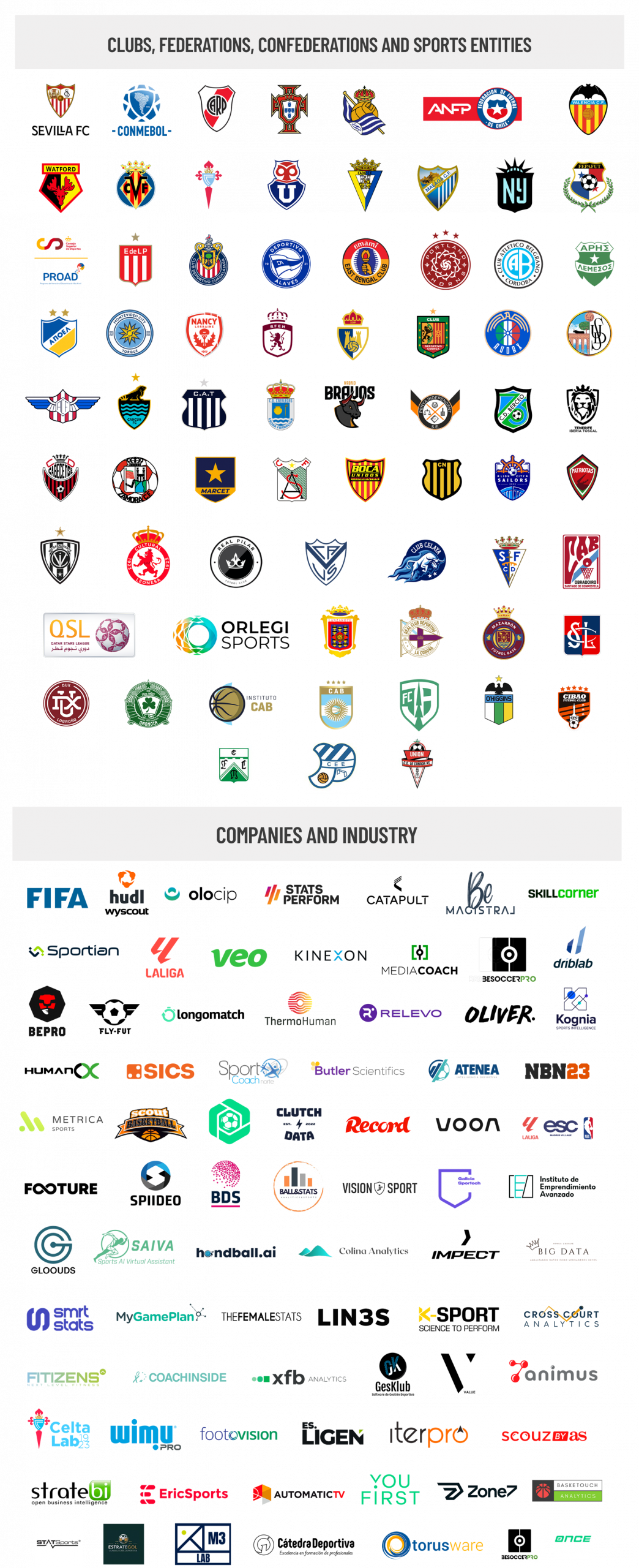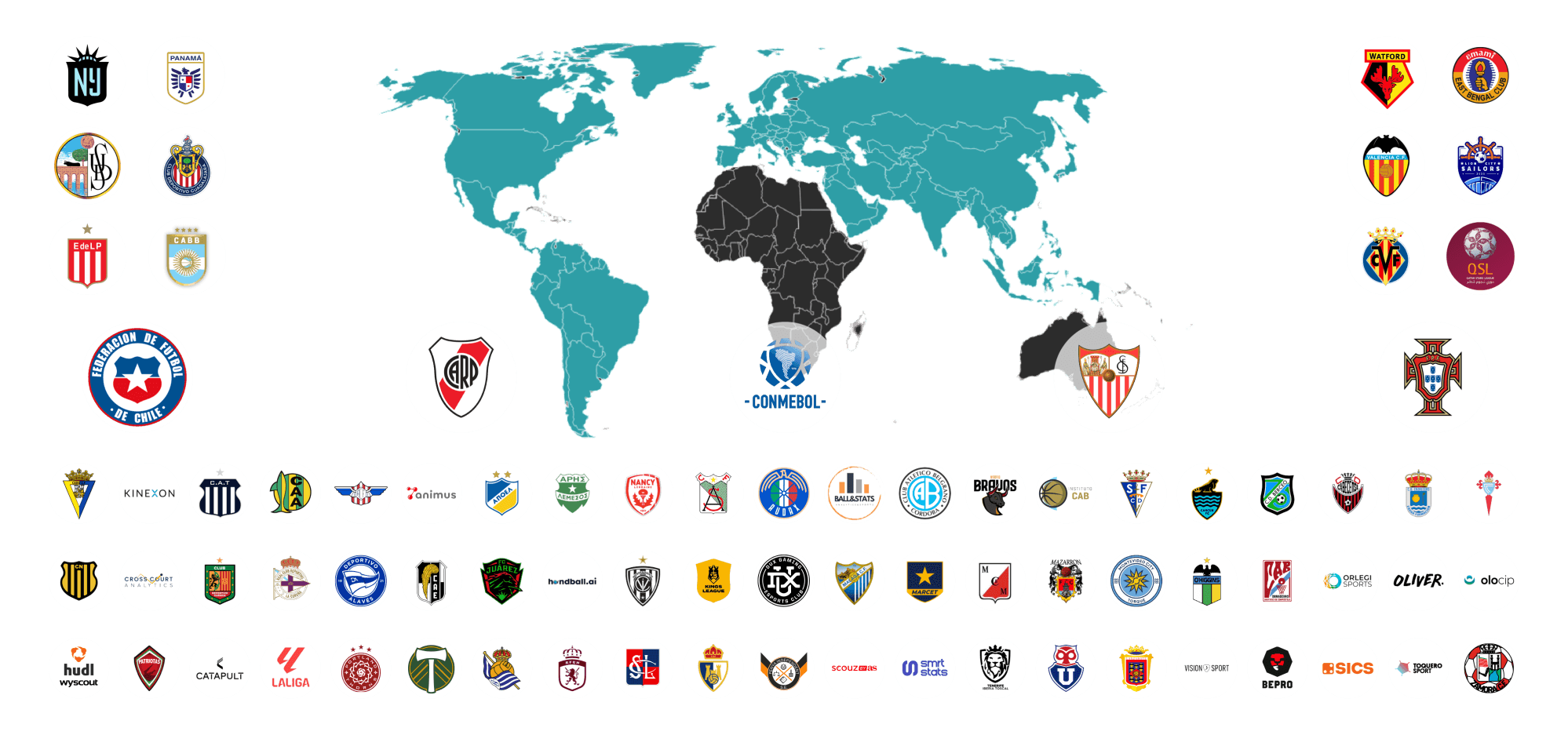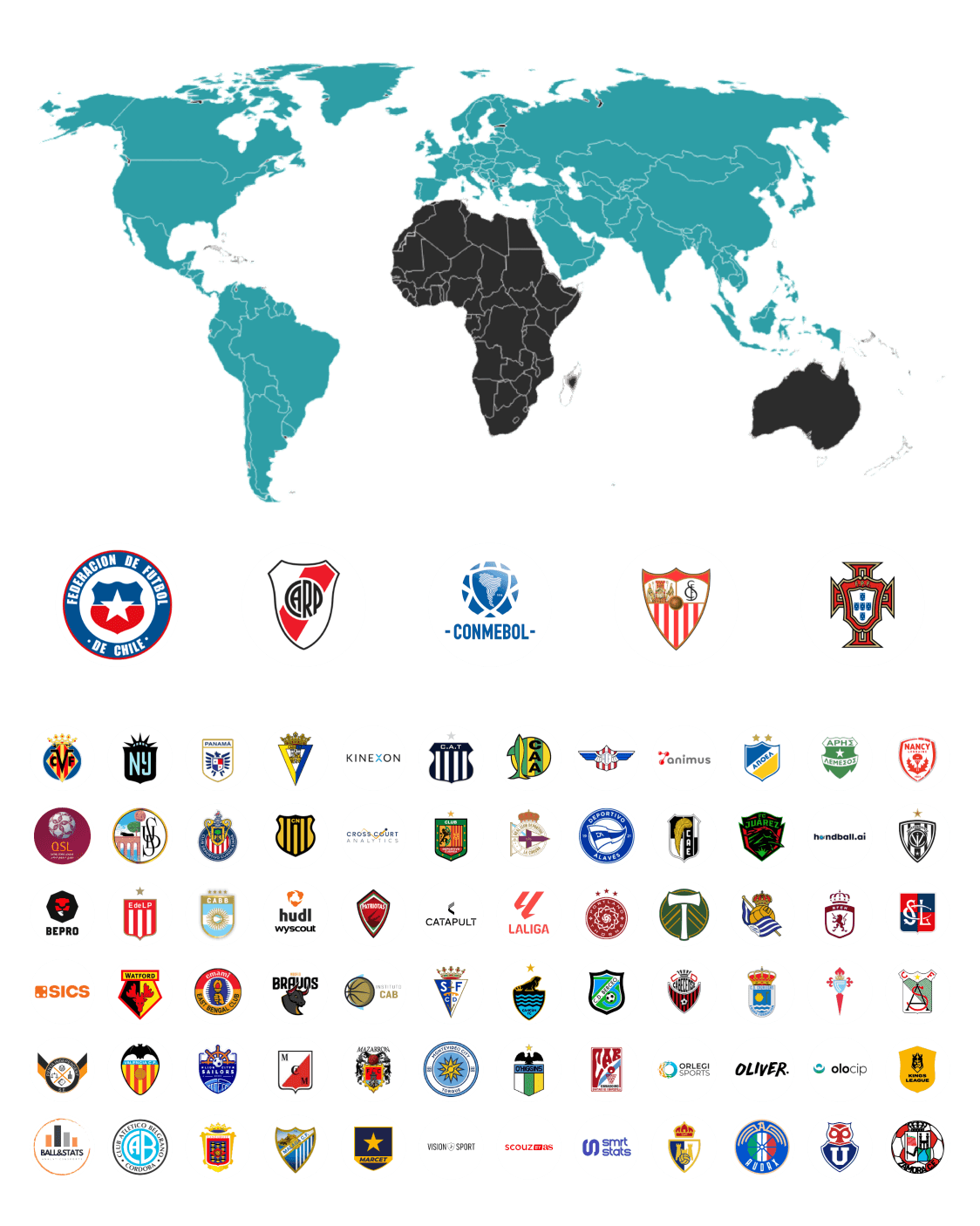
Máster’s Degree in
ADVANCED PYTHONAPPLIED TO FOOTBALL
Your year of entering professional football · Talk to an advisor today and we will analyse your situation · Active scholarships
Ready to Make a Difference in Sports Analysis with Python?
At Sports Data Campus, we invite you to dive into an advanced course that combines programming and sports to revolutionize sports data analysis.
This program is designed for alumni of the Master’s in Sports Big Data and professionals looking to enhance their Python skills, from data collection and analysis to visualization and machine learning, all focused on improving athletic performance.
Through real-world cases and practical methodology, you will be prepared to lead innovation and turn data into victories.
IN COLLABORATION WITH:

Who Is This Program For
The Máster’s Degree in Advanced Python Applied to Football is designed for professionals and students who want to master Python in data analysis and management, focusing on programming, automation, machine learning, and visualization.
It is ideal for:
- Analysts, data scientists, engineers, and developers.
- Recent graduates in big data, computer science, mathematics, statistics, economics, or related fields.
- Anyone interested in specializing in data analysis and automation, especially in the sports sector.
A key training for those seeking to enhance technical skills or open new career opportunities in a growing industry.
Career Opportunities
Graduates of the Máster’s Degree in Advanced Python Applied to Football are prepared to take on, among others, the following roles:
 Data Scientist:
Data Scientist:
Specialist in analyzing and interpreting large volumes of data to support strategic decision-making.
Data Analyst:
Professional responsible for processing, analyzing, and visualizing data to extract valuable insights across various sectors.
Data Engineer:
Responsible for designing, building, and maintaining scalable and efficient data infrastructures.
Python Software Developer:
Creation of applications, tools, and automated solutions using Python as the main programming language.
Machine Learning and Artificial Intelligence Specialist:
Development of predictive models and advanced algorithms for automation and technological innovation.
Automation and Scripting Engineer:
Implementation of scripts and tools to optimize processes and improve efficiency in organizations.
Data Analytics Consultant:
Advising organizations on how to leverage data to improve performance and decision-making.
Sports Data Analyst:
Application of data analysis in the sports field to enhance the performance of athletes and teams.
Why Choose Our Master’s?
Enrolling in the Máster’s Degree in Advanced Python Applied to Football will allow you to learn from industry experts, gain advanced tools to manage and analyze data focused on athletic performance, and stand out in a constantly evolving market that demands highly skilled professionals in data analysis and sports technology.

A unique training program, with exclusive and one-of-a-kind content

We are the leading campus and the largest community on Big Data and sports in Spanish

We have already trained over 3.100 students from all major leagues and various sports

We collaborate with over 100 clubs and professional teams, and with more than 120 leading companies in their sector

We guarantee you a unique learning experience, with support at all times and always available for you

Post and find opportunities in our community full of professionals for networking

A master’s program certified by UCAM and Sports Data Campus

Our instructors and masterclasses are world-class. You will have access to exclusive events with them

Don’t forget to ask about our international scholarship program and study grants

START TODAY WITH THE FREE INCLUDED PRE-MASTER PROGRAMME (valued at €5,000)
You will also have access to four courses, each of which grants a certificate upon successful completion. Throughout the PreMaster, in short, you will be able to immerse yourself in the essential aspects of the Big Data in Sport ecosystem and acquire and train a series of competencies that will be of great use throughout the Master's Programme.
-

Immediate access after enrollment
Start learning today.
-

4 Certificates
Get the four foundational certificates in Football Analysis, R, Python, and Data Visualization, included with your enrollment.
-

Start ahead
You overcome technical fear and adapt faster to the workflow.
-

Exclusive
Included only with your enrollment in this Master’s program (not sold separately).
CERTIFICATE PROGRAM IN FUNDAMENTALS OF DATA ANALYSIS IN FOOTBALL
Learn the basics of football data analysis in a clear and practical way. Tutor: Pablo Sanzol.CERTIFICATE PROGRAM IN FOUNDATIONS OF DATA VISUALIZATION IN SOCCER ANALYTICS
Introduction to BI tools to turn football metrics into actionable insights and build dashboards. Tutor: David Fombella.CERTIFICATE PROGRAM IN STATISTICS AND MATHEMATICS APPLIED TO SPORT WITH R
Learn R programming from scratch to manipulate and analyze sports data, create visualizations, and gain confidence for further studies. Tutor: Javier Fernández.CERTIFICATE PROGRAM IN FUNDAMENTALS OF SPORTS DATA ANALYSIS WITH PYTHON
Learn Python from scratch to understand programming logic, work with data structures, and gain confidence for automation, software development, and data analysis. Tutor: Lucas Bracamonte.
ACCESS TO THE INTERNATIONAL PROGRAM OF
SCHOLARSHIPS
BECAUSE COLLABORATION IS STRENGTH
PROUD OF OUR ECOSYSTEM OF PARTNERS, WHICH KEEPS GROWING EVERY DAY

OUR STUDENTS’ OPINIONS
We are very proud of each and every one of the students who have passed through Sports Data Campus, and who are now part of this great family.
Thank you all so much for your effort

Tommy las
Student MSC Data analytics in Football

Dimitris Stougiannou
Sports Data Analyst

Doowon Son
Sales agent of k-Sports

Kypros Nicolau
Talent ID an Recruitment Coordinator of Nothingam Forest

Tommy las
QA Enginner and Data Science Enthusiast

Marwane Hamdani
Football Data Scientist

Athanasios Ginnopoulos
Mathematician

Nikos Alagkiozoglou
U19 Performance analyst

Gabriel Abilleira Rodriguez
Data Scientist

Polykarpos Efthymiou
Fraud risk analyst
What we offer you
THE PROGRAM
A TRAINING PROGRAM THAT WILL REVOLUTIONIZE THE WORLD OF PYTHON IN SPORTS. HERE IT IS:
XXXX
Your content goes here. Edit or remove this text inline or in the module Content settings. You can also style every aspect of this content in the module Design settings and even apply custom CSS to this text in the module Advanced settings.
MODULE 1. AI-ASSISTED DEVELOPMENT TOOLS FOR SPORTS DATA ANALYSIS (3 ECTS)
Innovative course designed to immerse students in the practical use of AI-assisted programming tools, demonstrating how these technologies are redefining the contemporary software development cycle. The module provides a comprehensive view of applied AI, with special emphasis on advanced solutions and their real impact on a rapidly growing industry. Beyond technical knowledge, it fosters a proactive and critical approach, preparing students to add differentiated value in modern sports analytics.
- Introduction to AI-Assisted Development Tools
- Overview of AI tools in software development.
- Benefits and limitations of using AI assistants in programming.
- Examples of how AI tools are transforming software development.
- Using Code Assistants and AI Tools in Python
- Introduction to GitHub Copilot, ChatGPT, and other code-assistance tools.
- Practical cases and examples of how these tools can accelerate coding and improve code quality in sports data analysis projects.
- Optimizing Data Analysis Processes with AI Tools and Static Code Analysis
- Using Mito for interactive data exploration and simplifying the data analysis process.
- Applying Blackbox Code to optimize and understand large codebases.
- Introduction to static code analysis with Pylint, Mypy, and refactoring tools such as Rope and Vulture.
- Practical exercises to improve code quality using static analysis and refactoring.
MÓDULO 2. USE OF THE PANDAS LIBRARY APPLIED TO SPORTS (3 ECTS)
In this course, students will discover the pandas library and learn to create Series and DataFrames; clean, index, filter, and transform data for analysis in Python. Techniques for grouping, aggregation, and effective visualization, including building dashboards, will also be covered. The course concludes by teaching how to handle and interpret errors and warnings, controlling them with exceptions to ensure reliable code.
- Introduction to the pandas library
- What is pandas and why is it important in data analysis?
- Installation and setup of pandas in development environments.
- Structure and features of pandas data objects.
- Data structures in pandas
- Series and DataFrames
- Creating and manipulating Series in pandas.
- Creating and manipulating DataFrames in pandas.
- Indexing and selecting data in Series and DataFrames.
- Data manipulation and cleaning with pandas
- Cleaning and transforming inconsistent or missing data.
- Handling duplicate data and outliers.
- Combining datasets and resolving conflicts.
- Indexing and filtering data in pandas
- Indexing and selection based on labels and positions.
- Filtering data using logical conditions and boolean expressions.
- Using advanced indexing and filtering methods in pandas.
- Operations and transformations in pandas
- Performing arithmetic and logical operations on pandas data.
- Applying functions to columns and rows in DataFrames.
- Transforming and manipulating data using pandas functions and methods.
- Grouping and aggregation of data in pandas
- Grouping data based on specific criteria.
- Calculating descriptive statistics and aggregations for data groups.
- Applying custom functions to data groups in pandas.
- Data visualization with pandas
- Using pandas to create basic visualizations, such as bar charts and line plots.
- Customizing charts and visual representation of data in pandas.
- Exploring and presenting data using pandas visualization tools.
- Exception handling in pandas
- Introduction to exception handling and its importance for code robustness.
- Implementing try, except, else, and finally blocks in scripts using pandas.
- Creating custom exceptions to handle specific errors in data manipulation.
- Packaging Functions and Publishing on PyPI
- Principles of packaging Python code for reuse and distribution.
- Creating a package with custom functions that use pandas.
- Documenting and structuring a package according to PyPI standards.
- Steps to publish the package on the Python Package Index (PyPI) and version management.
MÓDULO 3. READING SPORTS DATASETS IN CSV, EXCEL, XML, HTML, AND JSON (3 ECTS)
An innovative course that immerses students in the practical use of AI-assisted programming tools, showing how these technologies are redefining the contemporary software development cycle. The module provides a global view of applied AI, with special emphasis on advanced solutions and their real impact in a continuously growing industry. In addition to solid technical knowledge, it fosters a proactive and critical approach, preparing students to contribute differential value in modern sports analytics.
- Introduction to data file reading
- Importance of file reading in data analysis.
- Types of data files used in the context of sports analysis.
- Considerations and best practices when reading data files in Python.
- Reading and writing CSV files in Python
- Using the pandas library to read and write CSV files.
- Setting parameters and options when reading CSV files.
- Manipulating and transforming CSV data using pandas.
- Reading and writing Excel files in Python
- Using the pandas library to read and write Excel files.
- Manipulating and transforming spreadsheet data using pandas.
- Using specific pandas functions to interact with Excel data.
- Reading and writing XML files in Python
- Using the xml.etree.ElementTree library to read and write XML files.
- Extracting and manipulating XML data using library methods.
- Transforming and structuring XML data for further analysis.
- Reading and writing JSON files in Python
- Using the json library to read and write JSON files.
- Extracting and manipulating JSON data using library methods.
- Transforming and structuring JSON data for further analysis.
- Data manipulation in different formats
- Converting between data file formats (CSV, Excel, XML, HTML, JSON) using pandas.
- Extracting, combining, and transforming data from different formats.
- Applying cleaning and data preparation techniques in different formats.
- Reading multiple files from the same directory and unifying them into one.
MÓDULO 4. DATA CAPTURING TECHNIQUES FROM SPORTS SOURCES (3 ECTS)
This course provides a professional immersion in sports scraping for both static and dynamic web pages. Students will master a range of tools that automate the capture of statistics from any web source. In addition to BeautifulSoup, it includes Selenium, client-server architecture, and advanced use of browser development tools. Students will learn to identify and manipulate APIs, headers, and cookies, creating reliable automations for systematic data extraction. Techniques for “humanization” are covered to prevent blocks and ensure consistent processes. All concepts are applied to practical cases, enabling analysts and scouts to build robust systems that feed advanced analysis. This module is ideal for professionals in analytics, scouting, or sports technology who need automated access to data not provided by conventional APIs.
- Fundamentals of Web Scraping
- Introduction to web scraping and its strategic application in sports data analysis
- Web architecture: understanding the client-server flow and its impact on data extraction
- Browser development tools: element inspector, network, console, and application
- Extraction Techniques for Static and Dynamic Pages
- Basic structure of web pages (HTML, CSS, JavaScript)
- Identification of advanced selectors (XPath, CSS selectors)
- BeautifulSoup for static pages: efficient extraction of tables and structured data
- Selenium for dynamic content: automated navigation and interaction with JavaScript elements
- Advanced Automation and Handling Hidden APIs
- Detection and exploitation of internal APIs in sports websites
- Manipulation of headers, cookies, and session parameters
- “Humanization” techniques to avoid blocks and limitations (timing, user-agent rotation)
- Parallelization and optimization of large-scale extraction processes
- Storage and Processing of Extracted Data
- Structuring and cleaning extracted sports data
- Automation of complete workflows: extraction – processing – storage
- Scheduling periodic extractions to track competitions
- Legal and Ethical Aspects of Professional Web Scraping
- Legal framework applicable to sports data extraction
- Analysis of txt and rate limits
- Best practices for responsible and sustainable scraping
- Applied Projects in Sports Analysis
- Construction of historical performance datasets for teams/players
- Automated scouting and talent tracking systems
- Multichannel extraction: combining data from different sources for integrated analysis
- Implementation of a complete extraction system for competitive analysis
MÓDULO 5. APIS FOR SPORTS ANALYTICS (3 ECTS)
In this course, students will learn to interact with APIs in Python and use them as a data source for sports data analysis. They will learn how to make API requests, obtain and process the retrieved data, and combine information from different sources through APIs. The course also covers the integration of external data into analysis and the evaluation of the quality and relevance of data obtained through APIs. By the end of this module, students will be able to use APIs as a powerful tool to obtain up-to-date data and enrich sports data analysis.
- Introduction to APIs and their importance in sports data analysis
- Concept and role of APIs in the context of sports data analysis.
- Benefits and applications of using APIs to obtain updated data.
- Examples of popular APIs used in the sports field.
- Interacting with APIs in Python
- Using libraries such as requests and urllib to make API requests.
- Authentication and handling access tokens to access API data.
- Managing responses and errors when interacting with APIs in Python.
- Obtaining sports data through APIs
- Identifying and selecting relevant APIs to obtain sports data.
- Examples of APIs used in sports to get information such as match results, player statistics, etc.
- Extracting and storing data obtained from APIs in a format suitable for analysis.
- Manipulating and processing data obtained from APIs
- Cleaning and transforming data obtained from APIs for analysis.
- Selecting and filtering relevant data using data manipulation techniques in Python.
- Applying operations and transformations on the data to obtain meaningful information.
- Integrating data from different sources through APIs
- Using APIs to obtain data from different sources and combine them into a single dataset.
- Normalizing and unifying data from multiple APIs.
- Solving data quality and consistency issues when integrating information from different sources.
- Using external data in sports data analysis
- Incorporating external data obtained through APIs into analyses and visualizations.
- Evaluating the relevance and quality of external data in the context of sports analysis.
- Performing comparative analyses and correlations using both internal and external data.
MÓDULO 6. MANAGEMENT OF SPORTS DATABASES AND CLOUD SERVICES (4 ECTS)
This course will provide students with the necessary skills to work efficiently with databases, a crucial component in sports data analysis, allowing them to manage large volumes of information and extract valuable insights for decision-making.
- Fundamentals of Databases and SQL:
- Basic principles of relational databases: tables, relationships, primary and foreign keys.
- Introduction to Structured Query Language (SQL), essential for data manipulation and querying.
- Introduction to MySQL and AWS RDS:
- This section will focus on teaching students how to use MySQL, a widely used database management system.
- Creating an Amazon RDS (Relational Database Service) account for database creation and management in the cloud.
- Connecting and Manipulating Databases with Python:
- Connecting Python to a database using the MySQL library.
- Executing basic operations such as SELECT, INSERT, UPDATE, DELETE, and CREATE VIEW.
- Advanced Queries:
- Joins
- String Functions
- Date and Time Functions
- Conversion Functions
- Aggregation Functions
- Flow Control Functions
- Mathematical Functions
- Group Functions
MÓDULO 7. LIBRARIES FOR SPORTS DATA VISUALIZATION (PLOTLY AND MPLSOCCER) (3 ECTS)
In this course, students will master Plotly to create and customize bar, line, and scatter charts, and explore mplsoccer to create football heatmaps, pass maps, and radar charts. They will also learn to present results clearly and persuasively. By the end, they will be able to produce impactful visualizations with Plotly and mplsoccer applied to football data analysis.
- Introduction to the Plotly library and its visualization capabilities
- Overview of the Plotly library and its use in data analysis.
- Main advantages and features of Plotly compared to other visualization libraries.
- Setting up and preparing the working environment to use Plotly in Python.
- Creating bar, line, scatter, and other types of charts with Plotly
- Using Plotly to generate bar charts, line charts, and scatter plots.
- Customization and configuration of charts created with Plotly.
- Incorporating interactivity in Plotly charts to explore and analyze data.
- Visualizing football-specific data using the mplsoccer library
- Introduction to the mplsoccer library and its focus on football data visualization.
- Creating football-specific visualizations such as heatmaps, pass maps, and radar charts.
- Customization and configuration of visualizations created with mplsoccer to highlight relevant information.
- Creating heatmaps, pass maps, and radar charts with mplsoccer
- Using mplsoccer to generate heatmaps showing event density on a football pitch.
- Creating pass maps to visualize player interactions and areas of high activity.
- Generating radar charts to compare the performance of players or teams across different aspects of the game.
- Effective presentation of visual results using Plotly and mplsoccer
- Incorporating visualizations created with Plotly and mplsoccer into reports and presentations.
- Selecting appropriate charts and visualizations to effectively communicate analysis results.
- Using visual elements and information design to enhance understanding and impact of visual results.
MÓDULO 8. CREATION AND DEPLOYMENT OF APPLICATIONS IN STREAMLIT (4 ECTS)
This course will not only teach students how to create applications with Streamlit, but also provide hands-on experience in launching their applications and troubleshooting common deployment and security issues.
- Introduction to Streamlit
- Basic concepts of Streamlit and its advantages for data analysis.
- Installation and setup of the development environment for Streamlit.
- Structure and basic components of a Streamlit application.
- Developing User Interfaces with Streamlit
- Designing the user interface using Streamlit widgets.
- Managing user input and controlling application state.
- Best practices for designing intuitive and appealing interfaces.
- Integrating Data Analysis in Streamlit
- Incorporating Python data analysis code into Streamlit.
- Visualizing sports data using interactive charts in Streamlit.
- Use cases for real-time analysis and presentation of results.
- Deployment of Streamlit Applications
- Methods for deploying Streamlit applications, including Streamlit Sharing.
- Configuration and use of deployment platforms such as Heroku and AWS.
- Security and access management in deployed Streamlit applications.
MÓDULO 9. DASH WITH PLOTLY FOR CREATING SPORTS DATA CENTRALIZATION APPLICATIONS (6 ECTS)
This course introduces Dash and its integration with Plotly to create interactive web apps in Python. Students will design layouts, configure components, add interactivity, and deploy projects on Heroku or AWS with login systems. They will develop flexible sports dashboards to explore and visualize data. By the end, they will be able to build and publish complete applications and dashboards with Dash and Plotly focused on sports analysis.
- Introduction to the Dash library and its application in creating interactive web applications
- Basic concepts of Dash and its integration with Plotly for building web applications.
- Main advantages and features of Dash in developing interactive applications.
- Setting up the working environment to use Dash in Python.
- Designing layouts and components for web applications with Dash
- Creating responsive layouts using Dash’s grid system.
- Configuration and customization of basic components such as buttons, charts, and tables.
- Organizing and structuring the user interface in a Dash web application.
- Creating charts and interactive components in web applications with Dash
- Using Dash callbacks to create interactivity between components and charts.
- Dynamically updating charts and visualizations in response to user events.
- Implementing interactive filters and selections to explore data in real time.
- Deployment of web applications created with Dash on cloud services like Heroku and AWS
- Preparation and configuration of a Dash web application for deployment on cloud services.
- Using platforms like Heroku and AWS to deploy and host Dash web applications.
- Configuring custom domains and security settings when deploying web applications.
- Implementation of login systems in web applications with Dash
- Incorporating authentication and authorization systems in Dash web applications.
- Creating login pages and managing users in Dash.
- Protecting and controlling access to specific functionalities in web applications.
- Development of interactive dashboards for sports data analysis
- Applying the concepts and techniques learned in Dash to develop interactive dashboards.
- Integrating visualizations, charts, and components into a complete dashboard.
- Configuring control panels, filters, and widgets to explore and analyze sports data.
MÓDULO 10. MACHINE LEARNING AND AI APPLIED TO SPORTS (4 ECTS)
This course introduces machine learning and AI applied to sports. Using Scikit-learn in Python, students will program regression and classification algorithms to analyze data and evaluate the performance of players and teams. By the end, they will be prepared to apply machine learning and artificial intelligence techniques in sports studies.
- Introduction to machine learning and artificial intelligence applied to sports
- Basic concepts of machine learning and artificial intelligence in the context of sports.
- Applications and benefits of machine learning and artificial intelligence in sports data analysis.
- Use cases and success examples of machine learning and AI in sports.
- Implementing machine learning algorithms with the Scikit-learn library
- Using the Scikit-learn library to implement machine learning algorithms in Python.
- Selection and preparation of data for training machine learning models.
- Evaluation and validation of models using partitioning techniques and performance metrics.
- Application of regression algorithms in sports data analysis
- Implementation and tuning of linear and nonlinear regression models in sports data analysis.
- Prediction and estimation of continuous variables, such as player performance or match outcomes.
- Interpretation and analysis of results obtained from regression models.
- Application of classification algorithms in sports data analysis
- Implementation and tuning of classification models, such as decision trees and SVM, in sports data analysis.
- Prediction and classification of categorical variables, such as player performance or team victory.
- Evaluation and analysis of the accuracy and performance of classification models.
- Evaluating player and team performance using machine learning models
- Using machine learning models to assess individual player and team performance.
- Identification of key variables and features for performance evaluation in sports.
- Analysis and interpretation of results obtained from machine learning models.
MODULE 11. FINAL COURSE PROJECT (FCP) (8 ECTS)
This course concludes the program, offering the opportunity to fully apply everything learned. The final project assesses the ability to carry out a complete sports data analysis, from the initial concept to the presentation. Guidance and feedback from mentors ensure deep and high-quality learning.
ACADEMIC DIRECTION

David R. Sáez
CEO at Sports Data Campus (ENIIT / Big Data International Campus)

Lucas Bracamonte
Professional Extension Director
INSTRUCTORS
TOP FACULTY AT YOUR SERVICE

LUCAS BRACAMONTE
Professional Extension Director

JAVIER FERNÁNDEZ RODRÍGUEZ
Senior Data Scientist at Sportian | Sports Data Campus

David Fombella
Big Data Consultant at StrateBI and Co-Academic Director
MASTERCLASS
PROFESSIONAL ANALYSTS, SPORTS DIRECTORS, COACHES, STAFF…

Diego Vilches
Team leader Linti - Atenea Inteligencia Deportiva

Fredi Martín
Qingdao West Coast

Sofía Errecarte
Technology Technician at Eniit

Pablo Sanzol
Technical Secretary of Deportivo Alavés

José Rodríguez
Data Analyst at Real Sociedad

Juan Manuel Bello
Head of Football Operations Iberia - Impect

Marcos Hernández
Tutor at Sports Data Campus and CTDA at Gloouds

Omar Bautista
Match & Scouting Data Analyst - Club Brugge

André Silveira Castanho
International Development Officer at Sports Data Campus

Guillermo Mora Arnés
Skillcorner - American Football Data Scientist

Anselmo Ruiz de Alarcon
USA National Team

Óscar Martín
CEO of Patrulla Mutante

Santiago Muñoz
Data Scientist at Libro de Pases

MATIAS PARODI
Software Developer & Consultant | Machine Learning | AI Innovator for Sports & Technology

Join our master’s programs and take part in the 2026 Global Project
Access real performance data from top players. Create metrics, predictions, and dashboards, and publish insights using professional methodology within a project team.
IN ADDITION TO THE OFFICIAL CERTIFICATION, THIS MASTER’S PROGRAM OFFERS 4 EXTRA CERTIFICATIONS TO COMPLEMENT YOUR TRAINING WITH ADDITIONAL SKILLS

CATAPULT PERFORMANCE CERTIFICATION

SOFT SKILLS CERTIFICATION

FOUNDATIONS OF THE GAME CERTIFICATION

LONGOMATCH VIDEO ANALYSIS CERTIFICATION

Physical Performance Certification
All our master’s degrees are certified by the most prestigious sports university: UCAM

At UCAM, we are in a constant state of evolution and at the forefront of technology and tools for a national and international benchmark learning experience.
WHAT WILL I RECEIVE WHEN I BECOME A STUDENT AT SPORTS DATA CAMPUS?
AS SOON AS YOU ENROLL
Included FREE Premaster (valued at 5,000€). You can start studying tomorrow and get:
> Certificate Program in Fundamentals of Data Analysis in Football
> Certificate Program in Foundations of Data Visualization in Soccer Analytics
> Certificate Program in Statistics and Mathematics Applied to Sport with R
> Certificate Program in Fundamentals of Sports Data Analysis with Python
WHILE YOU'RE STUDYING
Official University Certification by UCAM, the most prestigious Sports University globally
Additional certifications, providing you with a complete professional training:
> CATAPULT Performance Certification
> SPORTS DATA CAMPUS Soft Skills Certification
> LONGOMATCH Video Analysis Certification
> SPORT COACH NORTE Game Fundamentals Certification
> STATSPORTS Certification in Physical Performance
FROM THE VERY FIRST MOMENT
Access job opportunities and real-world projects with top-level teams through Sports Data Campus Professional Extension.
Access to our ecosystem of collaborators, with over 100 clubs and elite teams worldwide, and more than 120 leading companies in their sector
24/7 SUPPORT. We are with you at all times and always available whenever you need us.
A UNIQUE LEARNING EXPERIENCE, with high-quality and exclusive content that you won't find anywhere else, delivered by instructors and professionals from the best teams in the world
Exclusive and priority access to Sports Data Forum, events, workshops, special promotions...
You will be part of the largest Spanish-speaking community on Big Data and Sports, where thousands of students enhance their NETWORKING
“Never confuse Value and Price. Price is what you pay for a good or service. The value you receive for what you have paid is incalculable.”
GET INFORMATION






